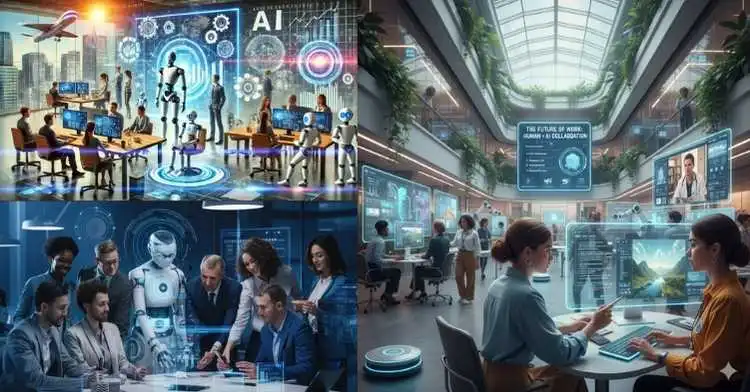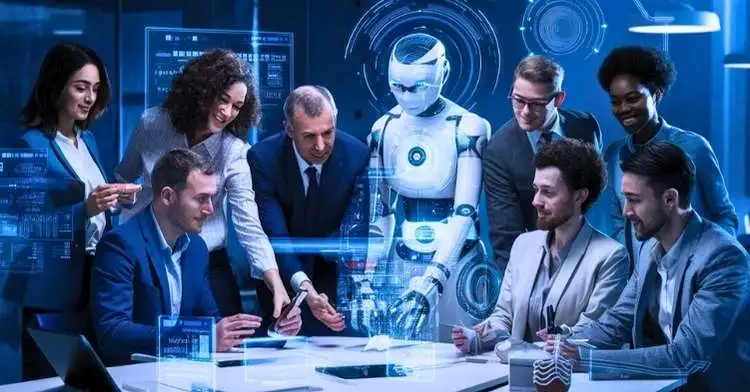Nowadays, the only topic of discussion is that Artificial Intelligence (AI) is changing the job market. By 2025, companies will be rapidly adopting AI, with a direct impact on jobs.
Somewhere, people are saying that millions of jobs are in danger, while on the other hand, many new roles and opportunities are also emerging. Let us know how AI is changing the job market and what its future is in the coming years.
TABLE OF CONTENTS
Table of Contents
Routine Work is Now in The Hands Of Machines
In 2025, the first impact is seen on routine and entry-level jobs. AI now completes tasks that require repeating the same steps quickly and accurately.
- Chatbots and automated systems now handle a large share of customer service calls.
- AI software has replaced humans in tasks like accounting and bookkeeping.
- From reception to sales, many such processes have now been automated.
This is why thousands of entry-level jobs have been lost at many companies. This is also known as the negative impact of artificial intelligence on employment.
New Jobs Are Also Being Created
But the other side of the picture is equally interesting. AI is not only eliminating jobs but also creating new jobs.
- Lakhs of new jobs are emerging in fields such as data science, machine learning, and AI development.
- The demand for AI experts is increasing across sectors such as healthcare, finance, and cybersecurity.
- The importance of such jobs, which require creativity, strategic thinking, and technical skills, has increased further.
That is, new career paths are opening up for those who upgrade their skills in time.
Trend of 2025: Human + AI
The future will not be about only machines or only humans. The real picture will be a combination of humans and AI.

- AI will perform extensive data analysis, but the final decision will be based on human understanding and judgment.
- Chatbots will answer customer service questions, but only humans will provide emotional support.
- In creative fields like writing and art, human imagination and thinking will still be paramount.
How Many Jobs Will Be Lost And When?
This question is on everyone’s mind: How many jobs will AI replace by 2030?
- According to the World Economic Forum, about 85 million jobs may be lost by 2025.
- Goldman Sachs estimates that AI can replace the equivalent of about 300 million full-time jobs by 2030.
- According to PwC, about 30% of jobs may be affected by automation by 2050.
That is, the answer to How many jobs will AI replace by 2050 is – a vast number, but new jobs will also be created at the same speed.
Which Jobs Will Be Lost?
The jobs that will be most affected between 2025 and 2030 are:
- Customer service representative
- Receptionist
- Bookkeeper and accountant
- Basic research and data analysis
- Sales and retail
- Warehouse staff
- Insurance underwriter
Most of the processes in these jobs are repetitive, which AI can handle better and more cheaply.
Which Jobs Will Remain Safe?
Not every job is in danger. AI will not be able to completely replace jobs that require human understanding, creativity, and emotion.
- Teachers
- Lawyers and judges
- Directors and CEOs
- HR managers
- Psychologists and doctors
- Artists and writers
In these jobs, the human touch, experience, and emotions are most important.
Impact of AI on the Economy
McKinsMcKinsey’st says that AI can add about $13 trillion to global GDP in the next few years. This will give about 1.2% additional growth every year.
That is, the answer to the question – How will AI affect jobs in the future in 2025? There will be fewer jobs, but the economy will also grow faster, and new business models will be created.
Time to Change Career and Learn New Skills
Are you thinking that AI is going to take over jobs in the future? Then the answer is – yes, to some extent. But the solution is to update your skills.
What to do?
- Adopt life-long learning – Learn new skills through online courses and training.
- Focus on soft skills – communication, problem-solving, and teamwork will always come in handy.
- Be agile – adapt quickly to change and be ready for new roles.
- Specialize – Gain deep knowledge in a particular field.
AI and The Future Of Society
What is the future prediction of AI in 2025?
- Better diagnosis and treatment will be available in healthcare.
- Personalized learning will become easier in the education sector.
- Transport, manufacturing, and logistics will change completely.
- But at the same time, legal and ethical challenges will also increase.
The job market of 2025 is very different from before. AI has automated many tasks, eliminating millions of jobs. But at the same time, new sectors, new skills, and new careers are also emerging rapidly.
If someone asks – How is AI changing job markets? – then directly answer.
1. Jobs AI Is Automating
AI excels at repetitive, data-driven, and routine tasks. By 2025, we’re going to have automation in:
- Customer Service: Chatbots and AI agents replacing call centers.
- Data Entry & Admin Work: Software automating spreadsheets, emails, and scheduling.
- Retail & Warehousing: AI-powered robots handling logistics, stocking, and deliveries.
- Basic Content Creation: Auto-generated news updates, product descriptions, and reports.
Example: Amazon and other retailers now rely heavily on AI logistics systems that reduce the need for human workers in warehouses.
2. New Careers Emerging With AI
While AI takes over routine work, it’s creating new industries and jobs:
- AI Trainers: Teaching AI models context, language, and ethics.
- Prompt Engineers: Designing effective AI queries for better results.
- Cybersecurity Analysts: Protecting systems from AI-driven threats.
- Data Scientists & Analysts: Making sense of the massive data AI produces.
- Human-AI Collaboration Specialists: Managing teams where humans and AI work together.
Example: Many companies now hire “AI Co” content strategists who “lend human creativity with AI outputs for marketing campaigns.
3. Skills in High Demand
To stay competitive, workers need to reskill and upskill. The hottest skills in 2025 include:
- AI literacy (understanding how to use AI tools)
- Data analytics & coding basics
- Critical thinking & problem-solving
- Emotional intelligence (something AI can’t create)
- Creative innovation (storytelling, design, and strategy)
How AI Is Changing the Job Market in 2025
4. Industries Most Impacted by AI
- Healthcare: AI-powered diagnostics and drug discovery.
- Finance: Automated trading, fraud detection, and risk analysis.
- Education: AI tutors and personalized learning platforms.
- Media & Marketing: AI-generated ads, videos, and campaigns.
- Transportation: Self-driving technology reshaping logistics.
5. The Human-AI Balance
The future isn’t AI replacing humans entirely; it’s AI’s collaboration.
- AI handles repetitive tasks.
- Humans provide creativity, empathy, and decision-making.
The most successful companies in 2025 are those that balance AI efficiency with human talent.
Pros & Cons of AI in the Job Market
Pros
- Increases productivity and innovation
- Opens new career paths
- Reduces repetitive, tedious tasks
- Boosts global competitiveness
Cons
- Job displacement in low-skill sectors
- Growing digital divide
- Risk of over-reliance on machines
- Ethical challenges (bias, privacy, surveillance)
In 2025, AI is transforming jobs, not destroying them. While automation replaces specific roles, it also opens doors to exciting new careers. The key for workers is to adapt, reskill, and embrace lifelong learning.
The future belongs to those who know how to work with AI, not against it.

